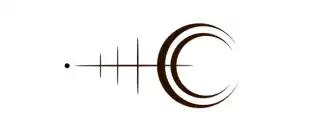When last did you indulge your darkness?
Does this question make you uncomfortable?
Notice the reactions in your body.
Many of us grew up in a Westernized society, often one that is largely molded by a Christian narrative. Many of us were taught that darkness is bad - is evil; that we shouldn't have bad thoughts or get angry. We were taught that we shouldn't have darker urges because that would mean that we were inherently bad. And who would want to be bad?
The Christian dichotomy of the Devil (embodying evil) and God (goodness) has in my opinion been grossly misconstrued. I can remember sitting in a Congregational Church many years ago as the Pastor (with a devilish look in his eyes) sermoned rather aggressively about how “THE DEVIL WILL GET YOU…” in this way and that, as people in the pews raised their hands in agreement, eyes closed and heads bowed in surrender. I was horrified. Could no one else see how skewed this all was? - A literal sermon of fear mongering; demonisation of the self and who we inherently are.
We persecute and point fingers and cower and shy away from all that is deemed the Devil’s work. We deny and shift blame onto others, the Devil included. And all the while we are just hiding from ourselves - lying to ourselves.
Instead of being something external from us - some demonic force - what if the Devil is just the archetype of our ego selves? - The 50% of us, the other half? - The half that forgets that we are connected to all that is; the half that thinks of ourselves as separate from God; the aspect that dwells within fear.
To know the self is to accept and work with this part of the self. To know the self is to see oneself in all our manifestations whether society has taught us to see it as bad or good. Jung calls this aspect of the self, the Shadow. Confronting your shadows aspects is an essential part of Jungian -psychoanalysis (Marlan, 2010:5). This is uncomfortable work that requires us to see the places where we are deluding ourselves, where we self-sabotage, where we harm others and ourselves.
To deny this part of the self is to allow it to fester and express unconsciously. Shall we not rather express it consciously? Safely? Without needing to call it bad? Allowing it a space where it can be liberated?
To work with the self is to explore the realms where we need to unlearn what we have been taught. This is one of those places. And it manifests in so many forms.
People like to misinterpret darkness for evil and this is exactly what causes evil: the fear and suppression of our own darkness. If it has had no empowering outlet, if it has not been acknowledged, then it must pour out by force in a fit of rage, in an act that is often truly evil. And when it does, the perpetrator quickly convinces themselves that they are indeed the victim, by finding someone else to blame (for surely it could not be their fault?) and so the cycle perpetuates itself over and over. Victim-perpetrator-victim-perpetrator…
If this darkness was given an expression, a voice, a space to be, where there was no judgment (and certainly with no harming of self or others) then it would have no reason to cause a splitting and festering into what we call evil.
I therefore encourage you to embrace your darkness. Give it space to be seen and expressed in a way that feels healthy for you, instead of remaining in the shadows where it is left to its own devices.
It is okay to admit that you have feelings of jealousy or rage. It is okay to be angry. All of this tells you something about the deeper self. It points to a part of you that needs healing or an outer circumstance that needs healing - both mirroring the other. Having a space to express is a great place to start the healing process.
Our shadow selves often show up in the dream spaces producing the kinds of dream images that we often feel ashamed of - the kinds of images we don't want to admit are being produced by our own psyches. It is useful to use your dreams as a guide to what you are hiding from yourself.
Accepting the darkness in yourself requires acceptance of the darkness in others too. We all have it. To persecute another is to persecute yourself. This is not to say that you should accept abusive energy directed at you. It means that you respect yourself enough to close the door on such unconscious behavior. Being conscious of your own shadow prevents abusive action from self towards others and therefore creates an intolerance of such activity from others towards self. It helps you to walk away from such toxicity with a sense of lightness. There is no need to point blame at the other. It's just a simple closing of a door; just gently moving on.
I know that in many situations this may be unyielding - when love and deep connection bind us to others who enact their suppressed shadows upon us and vice versa - also called trauma bonds. These are tough situations that often need immense strength to stay in and immense strength to leave. It requires a knowing of who we truly are. For those of you in these cycles I extend my compassion for I have done similar dances.
When you can see your own darkness in the actions of others, there is no need to persecute them. There is always a lesson there. When we integrate that lesson we liberate that shadow.
Part of the issue is that we have been taught that these dark traits are unlovable and this is a belief that we need to seriously shift. We need to dare to love and accept ourselves in all of our expressions and urges. Only love can transmute fear. Understanding that we can love people and not stay in relationships with them is also important. We cannot do shadow work for others, only ourselves.
So how do we begin to do this work?
The daily practice of meditation is an excellent tool in cultivating the conscious presence needed to see the self. It’s an excellent place to start.
Here is a process I tend to move through when I experience or witness darkness in the world or another (self):
- Ask yourself “how am I seeing myself?”
- Journal your honest thoughts and feelings
- Check yourself for righteousness
- Ask yourself “How does this reflect a belief that I have about myself or the world?”
- Journal your honest thoughts and feelings
- Check yourself for righteousness
- Ask yourself “Does this belief serve me or hinder me?”
- Journal your honest thoughts and feelings
- Check yourself for righteousness
- Ask yourself “How can I shift this belief to align with my higher expression?”
- Journal your honest thoughts and feelings
- Check yourself for righteousness
- Write empowering affirmations
- If you are on the receiving end of an abusive dynamic ask yourself “How can I leave this situation?” Find help and leave. You are worth it.
Find ways to embrace and play with your darkness that celebrate this aspect of yourself without harming another.
Some suggestions for playing with your darkness in a healthy way include:
- Exercise is an excellent way to release anger and rage, just be cautious of injuring your joints.
- Martial arts is a great way to channel anger and rage and cultivate self-control, self-understanding and discipline.
- Write in your journal to express your darkest thoughts; if you don't want anyone to see it afterwards you can burn it to transmute the energy.
- Speak with a therapist or a trusted friend.
- Draw or paint your thoughts, ideas or feelings; it's not about the end result here; it's all about the journey.
- Dress up to express your darkness through an embodied process.
- Dance to express in another embodied process; allow all of the ugliness to pour out of you through movement.
- Consensual sexual expression with a consenting partner is a great way to release darkness; many are open to this kind of roleplay.
Happy digging in your darkness! I hope you find treasures.
References:
Marlan, S., (2010). ‘Facing the Shadow’ in Stein, M., Jungian Psychoianalysis: Working in the Spirit of C.G. Jung. Chicago: Open Court Publishing, p.5.


